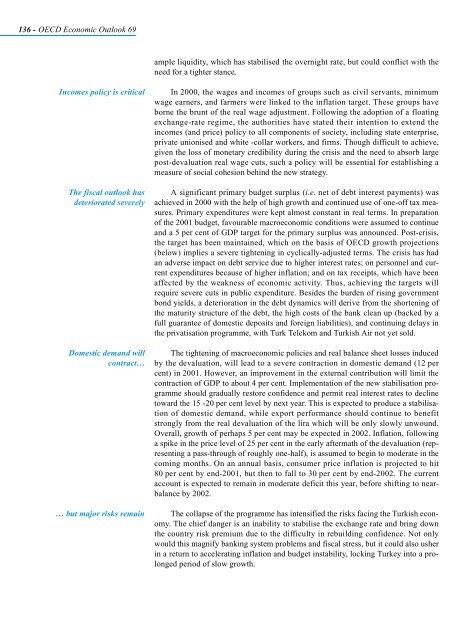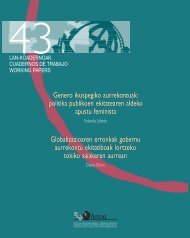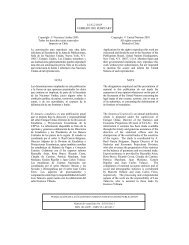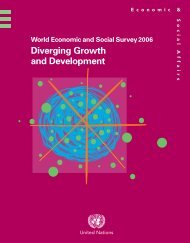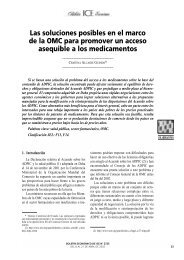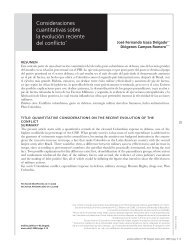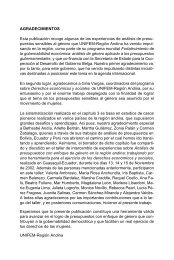OECD Economic Outlook 69 - Biblioteca Hegoa
OECD Economic Outlook 69 - Biblioteca Hegoa
OECD Economic Outlook 69 - Biblioteca Hegoa
Create successful ePaper yourself
Turn your PDF publications into a flip-book with our unique Google optimized e-Paper software.
136 - <strong>OECD</strong> <strong>Economic</strong> <strong>Outlook</strong> <strong>69</strong><br />
ample liquidity, which has stabilised the overnight rate, but could conflict with the<br />
need for a tighter stance.<br />
Incomes policy is critical In 2000, the wages and incomes of groups such as civil servants, minimum<br />
wage earners, and farmers were linked to the inflation target. These groups have<br />
borne the brunt of the real wage adjustment. Following the adoption of a floating<br />
exchange-rate regime, the authorities have stated their intention to extend the<br />
incomes (and price) policy to all components of society, including state enterprise,<br />
private unionised and white -collar workers, and firms. Though difficult to achieve,<br />
given the loss of monetary credibility during the crisis and the need to absorb large<br />
post-devaluation real wage cuts, such a policy will be essential for establishing a<br />
measure of social cohesion behind the new strategy.<br />
The fiscal outlook has<br />
deteriorated severely<br />
Domestic demand will<br />
contract…<br />
A significant primary budget surplus (i.e. net of debt interest payments) was<br />
achieved in 2000 with the help of high growth and continued use of one-off tax measures.<br />
Primary expenditures were kept almost constant in real terms. In preparation<br />
of the 2001 budget, favourable macroeconomic conditions were assumed to continue<br />
and a 5 per cent of GDP target for the primary surplus was announced. Post-crisis,<br />
the target has been maintained, which on the basis of <strong>OECD</strong> growth projections<br />
(below) implies a severe tightening in cyclically-adjusted terms. The crisis has had<br />
an adverse impact on debt service due to higher interest rates; on personnel and current<br />
expenditures because of higher inflation; and on tax receipts, which have been<br />
affected by the weakness of economic activity. Thus, achieving the targets will<br />
require severe cuts in public expenditure. Besides the burden of rising government<br />
bond yields, a deterioration in the debt dynamics will derive from the shortening of<br />
the maturity structure of the debt, the high costs of the bank clean up (backed by a<br />
full guarantee of domestic deposits and foreign liabilities), and continuing delays in<br />
the privatisation programme, with Turk Telekom and Turkish Air not yet sold.<br />
The tightening of macroeconomic policies and real balance sheet losses induced<br />
by the devaluation, will lead to a severe contraction in domestic demand (12 per<br />
cent) in 2001. However, an improvement in the external contribution will limit the<br />
contraction of GDP to about 4 per cent. Implementation of the new stabilisation programme<br />
should gradually restore confidence and permit real interest rates to decline<br />
toward the 15 -20 per cent level by next year. This is expected to produce a stabilisation<br />
of domestic demand, while export performance should continue to benefit<br />
strongly from the real devaluation of the lira which will be only slowly unwound.<br />
Overall, growth of perhaps 5 per cent may be expected in 2002. Inflation, following<br />
a spike in the price level of 25 per cent in the early aftermath of the devaluation (representing<br />
a pass-through of roughly one-half), is assumed to begin to moderate in the<br />
coming months. On an annual basis, consumer price inflation is projected to hit<br />
80 per cent by end-2001, but then to fall to 30 per cent by end-2002. The current<br />
account is expected to remain in moderate deficit this year, before shifting to nearbalance<br />
by 2002.<br />
… but major risks remain The collapse of the programme has intensified the risks facing the Turkish economy.<br />
The chief danger is an inability to stabilise the exchange rate and bring down<br />
the country risk premium due to the difficulty in rebuilding confidence. Not only<br />
would this magnify banking system problems and fiscal stress, but it could also usher<br />
in a return to accelerating inflation and budget instability, locking Turkey into a prolonged<br />
period of slow growth.


